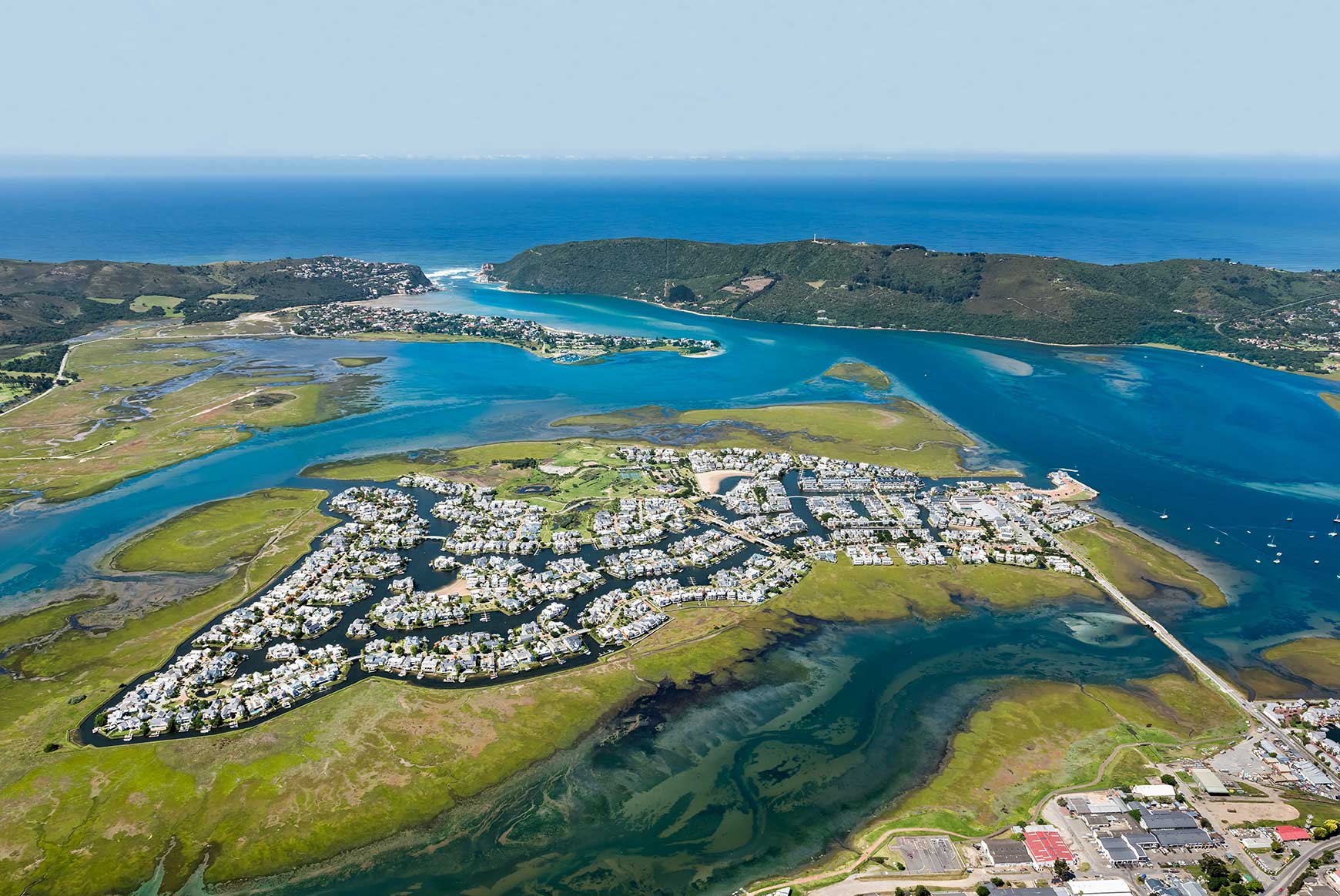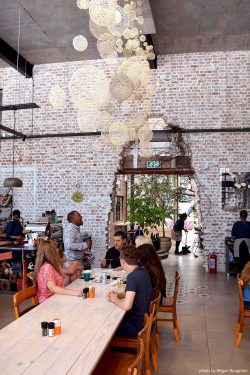Advertisement
We once read somewhere that we humans borrow from nature the space upon which we build. Often, the vision for creating such living spaces is squarely placed on architects, planners, and engineers. Thesen Islands is a perfect example.
Located in the scenic Knysna estuary on the renowned Garden Route of South Africa, the multi award-winning Thesen Islands marina and waterfront estate is spread over 90 hectares and is testament to the vision and determination of Chris Mulder and the firm CMAI he founded in 1980.
Mulder had set up CMAI in 1980 with his wife Pat upon their return from America. Having both graduated from the University of Pretoria, the couple obtained postgraduate qualifications from Texas A&M University, Chris with a PhD in Urban Design at the College of Architecture and Pat with a BSc in Horticulture/Interior Design and later a MBL at Unisa. Both hold directorships at CMAI and remain integral to the company and community – as do their family.
Their son Steff joined the CMAI team in 1998 and after graduating as an architect, helped to establish CMAI Architects in 2003, with architect Eugene Marais as partners, which runs in parallel with but is entirely independent from the original CMAI. This allowed the company to streamline processes and concentrate on both master planning and design aspects as well as for implementation of large-scale projects like Thesen Islands and other estates designed by the firm.
Back in the late 1990s, Thesen Islands was far from the uniquely exclusive waterfront lifestyle village that it is now known as. Instead, the area was little more than an industrial wasteland, polluted by chemicals from an on-site wood treatment plant. Many people and authorities were convinced that making the island habitable – let alone turning it into a luxury marina – was simply impossible.
Despite emotional ongoing criticism and plenty of rejections, Mulder was fiercely determined to change the industrial landscape into a naturally exclusive community that would become one of the continent’s most technically advanced marina and waterfront developments.
It has not been a simple feat by any means, and the multi-disciplinary design team he assembled had to comply with more than 100 rigorous environmental, cultural and historical conditions, which were demanded by the National, Provincial and Local authorities. One of these conditions included raising the existing floor levels by 1.8 metres. Faced with either building homes on stilts or raising the entire ground level of the island, the team chose the latter option and created 26 possible designs before the 27th was accepted.
Another condition was the preparation of an Environmental Management Plan that would guide the redevelopment of Thesen Islands in a manner that would enhance, rather than be of detriment to the Knysna estuarine environment, and the revered Knysna Sea Horse on a sustainable basis. The project provided a technical challenge in that, for the first time in South Africa and possibly the world, all salt marsh areas disturbed by the development had to be rehabilitated in such a manner as to ensure no nett loss of salt marsh. This also meant that no additional soil was permitted to be brought in from outside of the area and no soil could leave the island – instead Mulder and his team would spend the following seven years to obtain the required approvals and work out how to raise the entire island level by the required 1,8 meters from what was the existing 1.2m above mean sea level to the required 3m above mean sea level.
Advertisement
The hard work certainly paid off and Mulder was finally able to put an end to the criticism that he had faced. Construction of the first set of homes began in 2000, and seven years later, the entire development was sold and fully built, with 100 houses being constructed each year. In total, there now stand 512 individual homes, plus a commercial village centre, known as Thesen Harbour Town and several man-made beaches. An additional 56 apartment units, known as the Dry Mill apartments, are situated on their own island within the marina. Urban Economists calculated that the project injected R 3.4 billion into the local Knysna economy and it is probably, as an entity, the single biggest contributor to rates and tax base in Knysna.
What was once a contaminated zone is now a park, and there are fruit orchards, lush vegetation that mimics the wider region, and plenty of green open spaces, as well as 19 man-made islands linked by 21 arched bridges and surrounded by 25 hectares of tidal waterways.


The CMAI Architects philosophy is highly influenced by the Mulders’ exposure in America, where the new urbanism concept, or traditional neighbourhood design philosophy, has received extremely positive feedback. These neighbourhoods are built to reduce dependency on cars, provide easy access to public and commercial amenities, increase community interactivity, improve cost-effectiveness of services, and provide a simplified but higher than average quality of life.
The well-planned ideology chooses smaller houses with narrower streets for a closer community feel that focuses on the pedestrian as opposed to the motor vehicle. It certainly encompasses the ‘live, eat, work, play, stay’ catchphrase that was coined at the start of the development, which has lived up to its promise and is testament to why Chris and his entire family of four children still live and work on the estate.
CMAI previously had offices in Cape Town, Mossel Bay and Durban, with a head office originally in Pretoria. After a three-year stint working on large-scale projects and master planning in mainland China between 1995 and 1997, the couple decided to relocate the head office to Knysna to assume the full-time detail design, implementation and co-development function for Thesen Islands.
Attention to detail is meticulous here, and design guidelines, developed by specifically adhering to each plot were sold with the land and outlined how and where buildings could be erected and how high the structures could be. All the homes are built in a colonial maritime architectural style, conforming to Knysna’s vernacular architecture and its historical maritime and timber connections. Even the colours of the exterior walls have been chosen from a carefully selected palette of shades to ensure aesthetic appeal that blends in with the marine surroundings.
Thesen Harbour Town is the main commercial village of Thesen Islands and is a mere 10-minute stroll from the residential area. Whereas the residential area is only accessible by residents and their visitors through the 24/7 security gate, Thesen Harbour Town is open to all, and easily accessible via the causeway linking Thesen Islands with the mainland. The main street of the village is framed by weather-protected arcades as part of the Design Guidelines, featuring a varied mix of restaurants, boutique shops, two Hotels, offices and apartments, and ending in a typical village square with a long, scenic pier into the lagoon, offering beautiful views towards Knysna town and its harbour.
Many of the historic buildings in Thesen Harbour Town, such as the Sawtooth Building, Turbine Hotel and the Parking Garage, have been adapted and modernised for reuse by the CMAI Architects team, retaining an authentic sense of the past. The Boatshed was one such historical building, accommodating île de païn restaurant and The Lofts Boutique Hotel, and underwent a significant revitalisation project in 2017 after a devastating fire destroyed the building in 2015.
The Lofts Boutique Hotel now encompasses a remodelled timber frame and an industrial refurbishment that includes high ceilings, lots of character and the resemblance to an old passenger sailing vessel. There is a fresh, smart-casual approach and a wonderfully relaxed sophistication about the place, and the adjacent île de païn restaurant is owned and run by Mulder’s daughter Liezie and her partner Markus.
As one of South Africa’s most picturesque and popular coastal and waterfront developments, Thesen Islands delights, fascinates and captivates upon every visit. A winning combination of urban design and engineering intricacies, creative vision and undeterred commitment makes it the place to be and, if anything, Mulder and his family have shown that we humans not only borrow from nature the space upon which we build, but can in fact live, peacefully, side by side with it.
The Loft Boutique Hotel:
044 302 5710 | www.knysnahotel.co.za
CMAI Architects:
044 382 6732 | www.cmai.co.za
For property sales enquiries
072 171 1979 | jaime@estate-living.co.za



